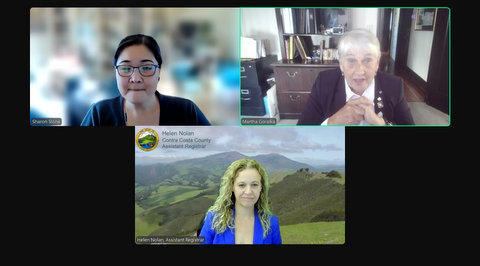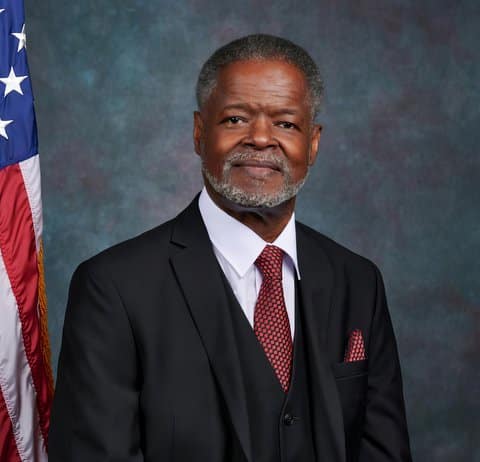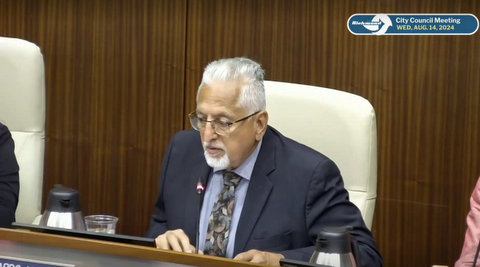
22 Sep Contra Costa Voters Given Info to Prepare for Election

Sharon Stone of the League of Women Voters, top left, and assistant county registrar Helen Nolan, center, were two of the speakers in a Sept. 19 webinar on voting in Contra Costa County. (Screenshot captured by Samantha Kennedy / The CC Pulse)
By Samantha Kennedy
Voters across Contra Costa face several decisions come Nov. 5 Election Day — a new county District 5 supervisor following Supervisor Federal Glover’s retirement after 24 years, the battle for Antioch’s mayoral seat and three City Council seats in Richmond that could help shape how a $550 million Chevron settlement is spent.
Across California, voters will be asked to pass judgment on measures covering such issues as minimum wage, affordable housing, how crimes are punished, wildfire prevention and formally protecting same-sex and interracial marriage. Also on ballots this November will be races for state and U.S. Senate, state Assembly, Congress, various other local offices, including school board positions, and, of course, the presidency — the last of which could have major consequences for the environment, the economy and much more, perhaps even the future of democracy in this country.
The task of voting can be daunting, but preparation can make it easier.
The Contra Costa County Elections Office and Vote411.org, a voter information network, teamed up Thursday in a webinar sponsored by the League of Women Voters, the Contra Costa County Library and Contra Costa TV to prepare Contra Costa voters for the election.
Contra Costa County election officials will send out voter information guides to all registered voters on Sept. 26, which will include a sample ballot, a map of ballot drop-off locations, early voting locations and information regarding local and county measures and races.
Guides will include candidate statements of those running for office in your local and county races and arguments for and against local measures.
“You can see what your local people want you to know about those measures,” said Helen Nolan, Contra Costa County’s assistant registrar, “and how it affects you.”
In general, voters must be a U.S. citizen, a resident of California, and 18 years of age or older to vote in elections across Contra Costa.
Unhoused residents can also vote in the election but still must provide a location to determine which contests they can vote in. The Elections Office says this can, for example, be a church, cross streets or a shelter. The mail can be sent to a shelter, a friend’s house or even a shipping store where the unhoused resident has a personal mailbox.
Official ballots are mailed to all registered voters on Oct.7.
Voters can also pick and choose which contests to vote in, according to Nolan, so if you don’t want to vote in a certain race, you don’t have to.
“Leaving a contest blank is fine and it doesn’t get your ballot disqualified,” said Nolan.
Once you’ve finished completing your vote-by-mail ballot, you can return the ballot by mail, at a secure ballot drop-off box, at any polling location on Election Day or at the elections office.
Nolan says voters by mail also have a new option this year. Instead of simply surrendering their ballot at a polling place on Election Day, voters can now fill out the vote-by-mail ballot at the polling location.
All vote-by-mail ballots must be signed with a signature that matches the one the elections office has on file, which, according to Nolan, is usually the one on your license or state ID.
In the event a ballot’s signature does not match or you forget to sign, officials will send you a letter to fix the problem. If a problem is not fixed, votes on the ballot will not be counted.
Sharon Stone, the membership and technology manager for the League of Women Voters of California, says one of the most comprehensive voting guides for Contra Costa is the League’s Vote411.org site, which gives you personalized voting information based on the address you provide.
Entering your address on the Vote411 site shows you what’s on your ballot, can show you local debates, and allows you to check your voter registration. You can register to vote online here.
The League also publishes an Easy Voter Guide that is presented in a digestible way, according to Stone, and is intended for voters who may not be well-versed in voting but are interested in learning more.
“This is a great way to get them involved because it is what I call ‘snack-size information,’ ” said Stone. “Just little pieces of information written in plain language.”
The Easy Voter Guide is offered in five languages — English, Spanish, Chinese, Korean and Vietnamese — and can be accessed online at cavotes.org/easy-voter-guide/.
In June, the Contra Costa County Elections Office launched a campaign to fight election mis- and disinformation amid a “growing tide” of misinformation across the country, according to a June 18 release.
The over $700,000 campaign — which started its second wave of advertising this month and lasts until October — hopes to reassure voters “of election integrity and security,” the release says, “by shining a light on the comprehensive steps taken to deliver on that promise.”
The number of steps taken to ensure the security of elections? 48.
“We think it’s imperative that the public understands what we do,” Kristin Connelly, Contra Costa’s clerk-recorder, said at Thursday’s webinar, “and has faith in our work.”
Campaign funding comes from a $2 million grant awarded to the Elections Office after being selected as one of 10 Centers for Election Excellence nationwide by the U.S. Alliance for Election Excellence.
“We have a really sophisticated operation and really experienced team that is excited to administer this presidential election,” said Connelly.
Among the steps taken by the team to ensure a secure election process are: requiring two people to be present with ballots, partnering with local law enforcement to secure facilities, ballot security features, such as tamper-evident seals, and staff only having access to systems needed to do their job.
In addition to community outreach and voter education, the campaign trains almost 100 election ambassadors who use social media to inform voters about election integrity in Contra Costa.
You can view all the ways the county protects elections at secure-election.org. And you can watch the full “Roadmap to Voting 2024” webinar on the Contra Costa Library YouTube channel.





No Comments